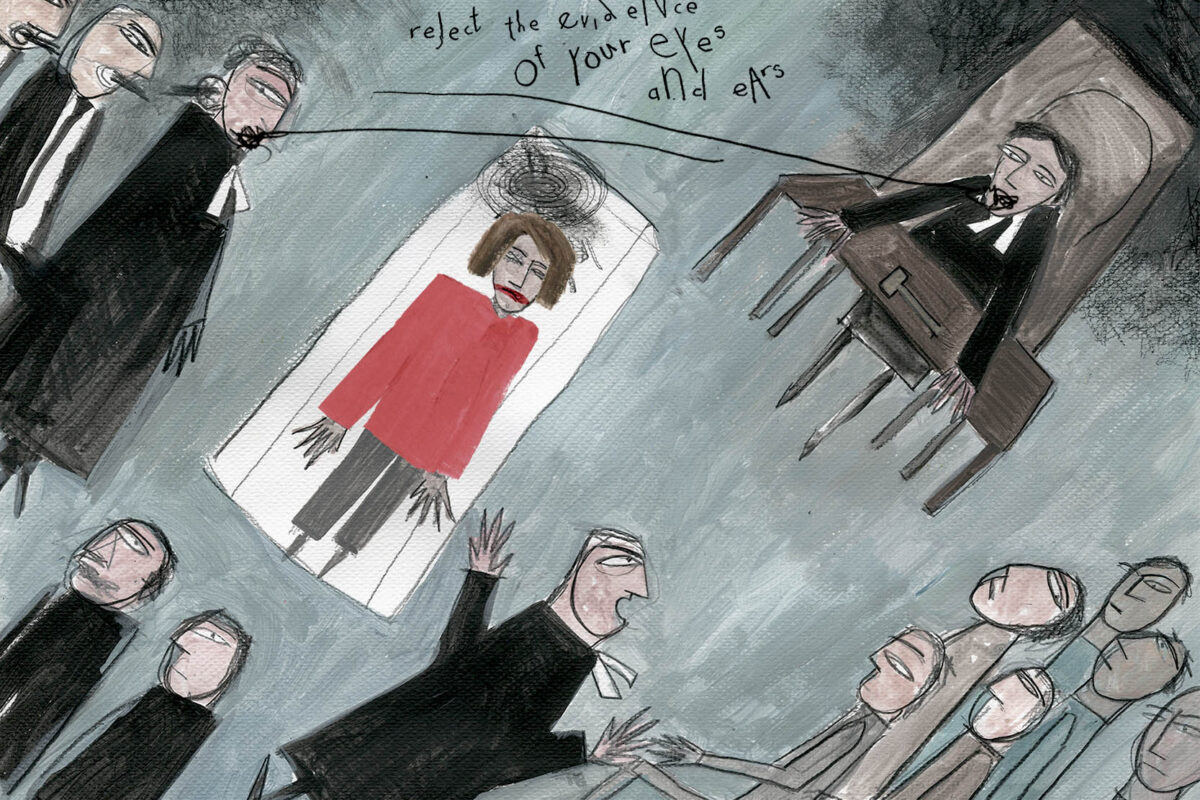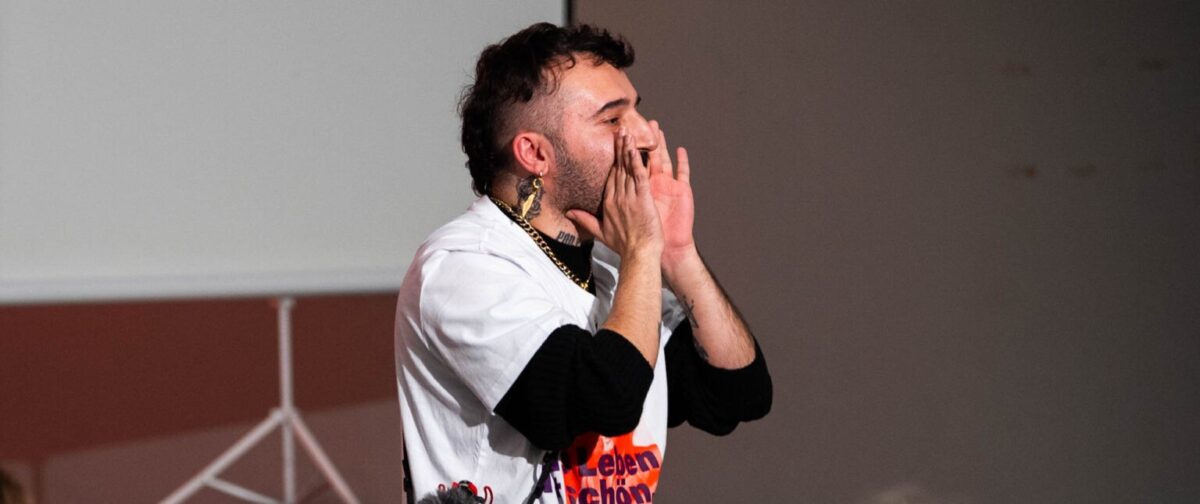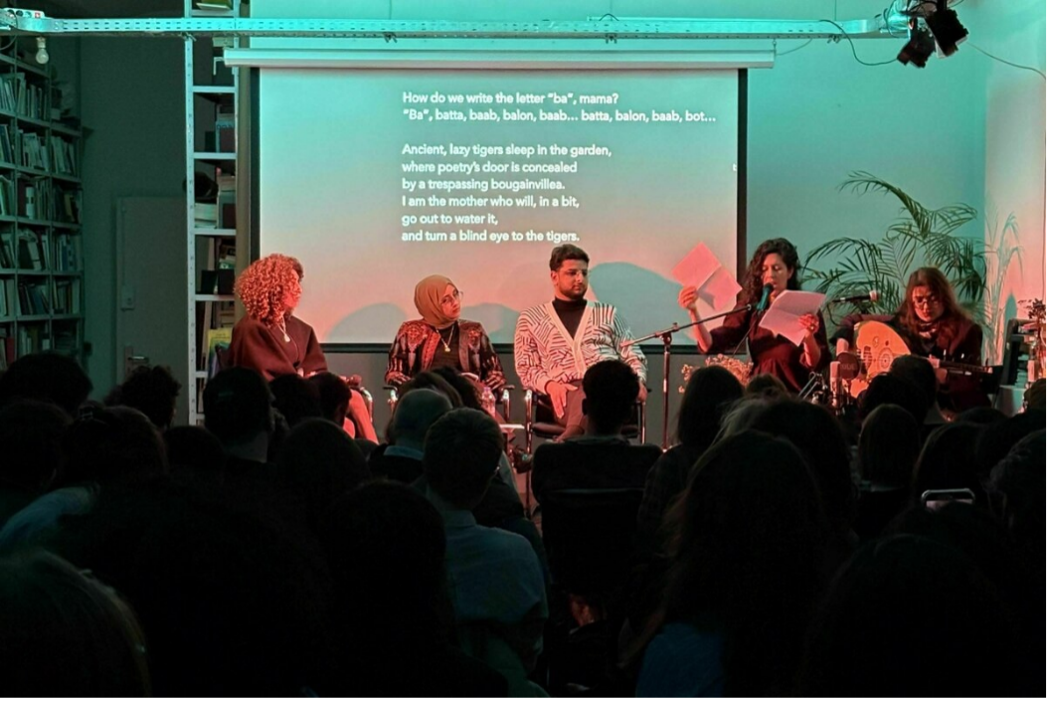In November 2023, a woman held a sign up outside the Bundestag asking if Germany had learned from the Holocaust and pointing out that 7,000 people had (by then) already died in Gaza. She was fined €1,600 and accused of Volksverhetzung – incitement.
Last week, on 1st October 2025, she was in court again, appealing that judgement. The judge threw out the case, pointing out that it was ridiculous that a law which was originally made to “stop class struggle” (his words), then later adapted in the 1960s and 1990s to counter a growing Nazi threat would be used in this case.
In court, the woman was allowed to make a statement. This is a translation of what she said.
Dear Mr Chairman, ladies and gentlemen, Mr Prosecutor.
In April of this year, I appeared in court for the first time and had to answer for an act that not only was I morally convinced about, but also believed to be covered by freedom of expression. Now I am back in court, because after more than two years of brutal warfare and massacres that have claimed more than 67,000 Palestinian lives, I am more convinced than ever of the question I asked in November 2023. We need to critically examine the past, because what significance does our culture of remembrance have if it is meaningless for our present? It is noteworthy that my question about the lessons learned from the Holocaust was interpreted very narrowly by the court, even though there are many references and answers to this question in public discourse as Jewish author, journalist and lawyer Ronen Steinke points out. So how can it be that there can only be one acceptable answer to this complex question, especially in view of the political and social changes? And what does it mean when public, multi-perspective discussions on this topic are thus prohibited by law?
For me, one thing has always been clear: the Holocaust was a crime against humanity and the darkest chapter in German history, which we commemorate in many ways—and rightly so. However, I do not believe in a culture of remembrance that upholsters our current perspective and our actions in the present, or worse still, serves as a justification for the suffering of others.
Our past obliges us. It obliges us to stand up for human rights, equality and democracy and against violence, hatred and war. The Jewish American-German author Deborah Feldman expressed this publicly on 1 November 2023 with the following words:
“I firmly believe that there is only one legitimate lesson to be learned from the Holocaust, and that is the absolute and unconditional defense of human rights for all.”
Two days after the Hamas attack the Israel Defense Minister Yoav Galant stated there: “will be no power, no food, no water, no fuel” for the Gaza strip. Israel, he said, is “fighting human animals and acting accordingly”—a statement that is not only deeply dehumanizing, but also violates international law. In the first weeks of the war alone, there were several thousand civilian casualties—including several children. Schools, hospitals and civilian infrastructure was bombed. The humanitarian situation in the Gaza Strip worsened with each passing week. Despite urgent warnings from numerous human rights organizations about a humanitarian catastrophe in the Gaza Strip and reminders from UN experts to comply with international law, the German government approved and supported the Israeli government’s rigorous and brutal actions in the Gaza Strip.
While international media reported almost daily on the war and the immeasurable suffering and destruction in the Gaza Strip, the majority of German media remained silent or justified the Israeli army’s inhumane and violent actions. Politicians and government representatives, who had condemned Hamas’ attack on Israel in clear and unambiguous words found themselves shrouded themselves in a deep silence.
Even after the first attack on a hospital on 17th October 2023, and sick, injured and vulnerable civilians fell victim to the attacks, German politicians refrained from condemning practices that are questionable/illegitimate under international law.
I remember that day as if it were a live broadcast—a humanitarian catastrophe unfolding in real time in the media. And yet all that remained was a feeling of powerlessness—the feeling of having to watch an act of horror without being able to do anything about it.
These images accompanied me every day and I asked myself: where is our voice? Why can’t we find clear words when it comes to alleged human rights and international law violations against Palestinians? Why this one-sidedness?
The early calls by UN experts for compliance with international law, a humanitarian ceasefire and a sustainable solution to the conflict remained largely unanswered.
I couldn’t understand why the German government paid such little attention to the UN’s demands and continued to give its unconditional support to the Israeli government. Particularly, due to Germany’s historical responsibility because of the Holocaust, advocating for the observance of human rights and international law would be logical.
Recent developments, such as the indictment of Israeli Prime Minister Benjamin Netanyahu and Israeli Defence Minister Yoav Gallant by the International Criminal Court, have shown me that my question was not exaggerated. It was an expression of genuine, well-founded concern.
They have reinforced my feeling that we—especially in Germany—have a responsibility to remain vigilant.
That is why I asked publicly: Have we learned nothing from the Holocaust?
I have, and continue to assume that the previous/first judgement is based on a misunderstanding of my appeal and that I am acting within the framework of our fundamental democratic rights when I use the Holocaust as a yardstick for other crimes against human and international law. Neither of my appeals is intended to trivialise the Holocaust. I have not made any statement as to whether the current events in Gaza can be compared to the Holocaust. Rather, in my appeal, I ask about the lessons of the Holocaust. These are the universal human rights for ALL. Article 1 of the 1948 Universal Declaration of Human Rights states: “All human beings are born free and equal in dignity and rights.” Every state is obliged not only to comply with international law, but also to work to ensure that other states comply with it. It is therefore our duty to stand up for human rights, regardless of who they are directed against.
Thank you for your attention.




